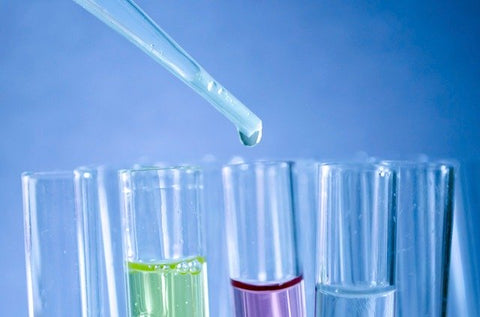What Are Parabens And Why You Should Avoid Them?
What are parabens?
Parabens are a preservative that was first introduced in the 1950s, it is common practice to put them in many health and beauty products as they prevent the growth of mould and bacteria. They are most common in products that contain significant quantities of water as they are prime breeding grounds for microbes. Products parabens are most common in include; shampoos, conditioners, hand wash, lotions, facial cleansers, shower cleansers and scrubs. Parabens are so frequently used because they are extremely effective, do not trigger allergies and of course cheap.
Spotting parabens is not as easy as looking for "contains parabens" on the bottle but these are three most common parabens that you will most likely see listed on the ingredients list of commercial health and beauty products and they are; butylparaben, methylparaben and propylparaben. Occasionally other parabens are used just look out for any ingredient name ending with "paraben" and you should be able to easily find out which products contain parabens.

The dangers of parabens
INDIVIDUALS MOST AT RISK FROM PARABENS: PREGNANT WOMEN AND YOUNG CHILDREN
Parabens enter your body with ease, they penetrate your skin, spread throughout your entire body and then they stay there. In studies conducted in the US parabens were found in nearly all urine samples of adults and they do not discriminate, they were found in people based on any metric such as ethnic, socioeconomic or geographic background. There does however seem to be higher concentrations of parabens found in adolescent and adult women, hardly surprising as they tend to use more cosmetic products.
Parabens cause hormone disruption
Parabens are classed as a endocrine disrupter, which means that they disrupt hormone functions. Parabens tend to mimic estrogen and too much oestrogen is linked to increased breast cell division and tumour growth.
In cell studies, parabens have been shown to actually bind with estrogen recpetors. The longer chain parabens have proven to be the worst offenders as they have the largest negative impact on hormone levels. This means the most dangerous parabens are butylparaben, isobutylparaben, isopropylparaben and propylparaben. Test results of these long chain parabens on rats displayed increased uterus weight and uterine sensitivity to estrogen in offspring. The paraben shown to have least estrogenic activity was ethylparaben.
It is not just estrogen that is effected by parabens there is evidence that parabens block androgens such as testosterone and they also hinder enzymes that metabolise estrogen.
Parabens have been linked to cancer
The links to oestrogen mimicry are what makes parabens a potential catalyst or cause for cancer, specifically breast cancer. Too much estrogen or your body thinking you have too much leads to increased breast cell division and increased chance of tumours.
People who apply many personal care products containing parabens also have an increased risk of skin cancer, people who use products containing methylparaben are particularly at risk. Parabens when applied to the surface of your skin enter the your skin cells and cause disruption to cell growth, those with more parabens in their skin cells have an increased risk of developing malignant melanoma (A type of skin cancer) because of estrogenic and genotoxic activities.
Parabens cause reproductive issues before, during and after gestation
The hormone disruption caused by parabens can also lead to reproductive issues. Trends in data suggest that the presence of propylparaben and butylparaben seem to have a negative influence on sperm production and also reduced testosterone levels. Methylparaben and ethylparaben appear to have no affect on sperm production. It is not just when trying to conceive a baby you should avoid parabens but also when pregnant and breastfeeding too, a study found that exposure to butylparaben during pregnancy and whilst breastfeeding alters the development of the offspring's reproductive organs, and even leads to increased risk of anxiety and behavioural changes.
Parabens are bad for the environment
Parabens are not just a problem for people, they also have an impact on the environment, specifically aquatic life. A scientific study reported parabens have been found in the bodies of marine mammals, this means that our sewage systems are not filtering parabens out of our waste water and parabens are finding their way into oceans, rivers and reservoirs.
How to avoid parabens
Some countries have already started to clamp down on parabens like Denmark for example, who have banned all forms of propylparben and butylparaben from cosmetic products for children under 3 years old. However the chances are your country is far off doing anything about regulating parabens.
So that means it is up to us to make sure what we use and put on our bodies is safe, look for products that actively claim to be paraben free as there are alternatives to parabens to stop our personal care products going bad. There are also preservative free products available that have a shorter shelf life of between 6 to 12 months. I recommend buying natural and organic soaps instead, as it is not just parabens you have to look out for. There are a whole host of nasty chemicals in commercial products and the shelves are rife with green washing at the moment which means that many products are not as safe or eco friendly as they seem.
If you do not currently know where to start to find products free from parabens have a look at our store we have in stock natural soaps, shampoos and conditioners in a wide variety of scents and they are cheap compare to many other natural soaps available online. We would appreciate the support more than you could imagine. All the soaps on our store are vegan, all natural, fragrance free, plastic free, cruelty free, parabens free and SLS free.
Sources
https://www.elle.com/uk/beauty/skin/articles/a36356/what-are-parabens/
http://www.safecosmetics.org/get-the-facts/chemicals-of-concern/parabens/

